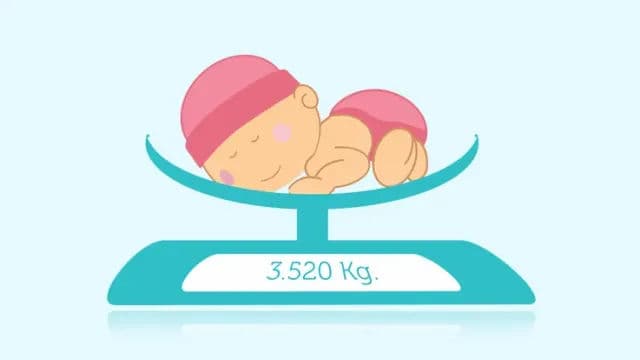caloric-recommendations ...
10 Newborn Baby Weight Hacks, Ideal Weight & Right Way to Measure

Published: 18/09/22
Updated: 20/03/25
Only For Pro
Reviewed by expert panel
Before I begin, I wish to reiterate that every baby is unique and so is his or her growth chart. That being said, doctors across the world measure the newborn baby weight as per designated parameters to keep a track of how well they are growing. Being a general indicator of wellness and good health, growth is essentially linked to being healthy. And one such indicator of a baby growing well and being healthy is baby weight. After birth, there are numerous ways to keep your baby's weight in check and many things that can be done to make sure your baby is growing into a healthy individual.
How Is A Baby's Weight Measured?
Baby weight is a significant way to measure how she is growing and progressing during the course of pregnancy and even after birth. It also holds significance since parents and doctors can take immediate action if something is amiss. Most pediatricians measure the growth of a baby between the regular appointments for the first year, with a lot of focus in the first 6 months. Weights are recorded and become a guide to how a baby is growing individually. It must, however, be noted that these measurements are relevant only to individual babies, and should not be used for comparisons. A steady weight gain between appointments is just what the doctor is looking for.
Must-Know Important Facts About Baby Weight
When it comes to a growing baby, the way the needle on the weighing machine moves, can change the way we perceive our children. But is that all that there is about children's weight? Here we collect 10 important points that
- Start Early: Your baby's birth weight is largely dependent on you. The weight of a woman throughout her life is more important than just the pregnancy per se. So a well-balanced diet, even before conception, helps in having a healthy weight baby. This is why pre-conception planning has assumed a lot of importance lately
- Weight Gain is Maximum in the Last Stretch: Many women worry when they do not gain a lot of weight during their first and second trimesters of pregnancy. However, unless your doctors tell you to fret, keep those anxieties away. The maximum weight gain of a fetus is in the last trimester, most likely in the 8th and 9th month. If the fetus is found to be lesser than average weight during an ultrasound scan, mothers are advised to add certain foods to their pregnancy diet to increase baby weight. A pregnant mother should focus on having a well-balanced diet in these months to have a healthy baby
- The Average Weight of Indian Babies: The average weight of an Indian infant, which is considered healthy, is between 2.7 to 2.9 kgs. The average weight gain is highest during the first three months, after birth. It is approximately 200 grams per week. The world health organization terms any baby weighing less than 2.5 kgs as underweight babies, no matter when they are born
- The Formula Makes Babies Chubbier: Formula-fed infants tend to have a higher weight gain as compared to breastmilk fed infants. Experts believe that this is because of the lack of self-regulation, according to the hunger (that is there in breastfeeding). Where breastfeeding is based on demand-supply, in a formula the child will drink as much as served to him possibly. But this is not always a healthy situation. Chubby infants are necessarily not healthy
- Every Child is Unique: Every child starts with different weight and has her own growth rate. It is not absolute body weight, at different ages, but her growth pattern which is more important. The child should be gaining weight over a period of time
- Weight Gain Timelines: An infant, getting optimum nutrition would double her birth weight by the age of 5 months and triple her birth weight by the age of one year. From birth till about 6 months, babies gain about 140 to 200 gms every week. After 6 months to their first birthday, babies gain 85 to 140 gms every week
- Second-year Weight Gain: During the second year, weight gain is slower. The total weight gain for the entire year is 2 kgs to 2.5 kgs. In the third year, the weight gain further drops to 1.5 kgs to 2 kgs for the entire year
- Different for different babies: There is no fixed weight which can be said as an ideal weight or a healthy weight. A healthy weight for each child is individual, within the standard ranges (+/- 10%). For e.g., if for a 2-year-old boy's standard weight is 12.5 kgs, we accept the range of 11.25 kgs to 13.75 kgs, which is +/-10% of 12.5 as the healthy weight
- Weight is not the only growth indicator: That weight gain is not the only indicator of the growth of the child. Height gain is an equally important growth indicator of the child. So, at times if your child is not gaining much weight but gaining good height, it means they are doing well. There is always a correlation in growth and babies do have times when they do not gain much weight and may even lose on a few grams
- Do not make your child obese: Do It is very important that a child should not be obese. If a child becomes obese or overweight in childhood itself, the chances of becoming obese or overweight as an adult are high. This happens because the number of fat cells becomes higher in the child's body. If the number of fat cells increases during childhood itself, then it becomes difficult to reduce the number of these fat cells later in adult life. This predisposes the child to obesity. [Read - Food to Increase Baby Weight in Pregnancy]
What Should be The Average Baby Weight At Birth?
A full-term baby born between 37 weeks and 40 weeks can weigh anywhere between 2.7–4.1 kg and the worldwide average is 3.5 kg. Babies who weigh less than 2.5 kg, irrespective of when they are born are termed as low birth-weight babies. Twins and triplets are often born prematurely and weigh under 2.5 kgs. Babies who weigh 4 kg or above at birth are referred to as macrosomia and are considered heavier than normal. Large babies are born to mothers who have gestational diabetes, are obese or gained more than the recommended weight during pregnancy. Babies who are born two weeks after their due date may also be heavier than normal.

What Is Normal Newborn Baby Weight In India?
A baby's birth weight can vary greatly, and is dependent on the mother's weight – pre-pregnancy and gain through the gestation period as well as the nutrition that she takes in. That is why the pregnancy diet assumes a lot of importance. Babies come in all sizes, with varied growth matrices. In India, a baby weighing 2.5 kg to 3.1 kg is considered close to ideal, considering the baby is full term. Babies who weigh less than 2.5 kg are termed as low birth weight babies as per the World Health Organization (WHO).
Why Newborn Baby Weight Loss?
As a parent, you might be taken by surprise when your baby is weighed on his first appointment after getting discharged from the hospital. The baby weight would have dropped by about 5% to 10% from her birth weight. Now this happens with most of the babies at large and is due to the loss of fluids from the body. As the baby feeds less initially, she does not gain those lost grams immediately, but within about 2 weeks time, when she should be back to her birth weight, if not above it. So, essentially, there should not be a cause to worry when your newborn baby drops a bit of her weight after going home.
Conclusion
The best way to monitor weight is growth monitoring chart. Here, weight against age is plotted on a graph. This chart has preset graphs indicating normal, under or overweight against age. When periodically weight is plotted against the age of the child, we get to know about the correct growth pattern of the child. If the child is steadily gaining weight, though slowly, the curve is normal. You can get this chart from your pediatrician.
Be the first to support
Be the first to share
Related Blogs & Vlogs
No related events found.

